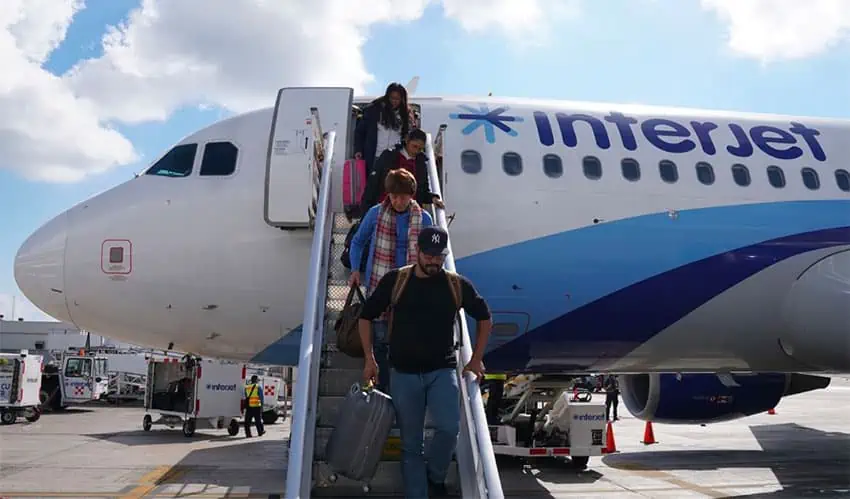Access selected deals available with budget and full-service airlines
Lock any airfare that sounds great. You don’t lose anything if you cancel it
Call us anytime for any assistance. We do not go into hibernation
Your personal and financial information stays secure with us
Interjet, officially ABC Aerolíneas, S.A. de C.V., was a Mexican low-cost airline headquartered in Mexico City, with its primary hub at Mexico City International Airport (MEX) and secondary hubs at Toluca’s Licenciado Adolfo López Mateos International Airport (TLC), Cancún International Airport (CUN), Guadalajara International Airport (GDL), and Monterrey International Airport (MTY). Founded in 2005 by the Alemán family, Interjet operated from December 1, 2005, until December 2020, serving 55 destinations, including 35 domestic and 20 international routes across the United States, Canada, Central America, South America, and the Caribbean. At its peak, it carried over 12 million passengers annually, holding a 22% domestic market share in Mexico by 2019. Interjet was a member of the International Air Transport Association (IATA) and held a Skytrax Three-Star Low-Cost Airline rating. Known for its hybrid model combining low fares with premium services like complimentary snacks and generous baggage allowances, Interjet ceased operations in December 2020 due to financial difficulties exacerbated by the COVID-19 pandemic. By April 2023, a federal court ordered its liquidation, ending hopes of revival.

Interjet was established in 2005 by Miguel Alemán Velasco and his son Miguel Alemán Magnani, descendants of former Mexican President Miguel Alemán Valdés (1946–1952). The airline aimed to compete with legacy carriers Aeroméxico and Mexicana de Aviación, launching operations from Toluca (TLC) to avoid slot constraints at Mexico City (MEX). Its first flight on December 1, 2005, used a leased Airbus A320, and within a year, Interjet transported 1.25 million passengers with a fleet of seven A320s, becoming Mexico’s fourth-largest carrier. By 2008, it achieved profitability, and following Mexicana’s 2010 collapse, Interjet became the second-largest domestic airline.
In 2011, Interjet made history with North America’s first biofuel-powered commercial flight (Mexico City–Tuxtla Gutiérrez) using an A320. That year, it ordered 15 Sukhoi Superjet 100s (SSJ100s) for $650 million, a controversial move due to the Russian aircraft’s maintenance challenges, with 22 delivered by 2016. In 2014, Interjet branded itself the “JetBlue of Mexico,” emphasizing low fares and customer-friendly policies like no overbooking. By 2018, it adopted a hybrid model, offering extras like extra legroom and 50 kg baggage allowances for Priority fares. International expansion included U.S. routes (e.g., Los Angeles, New York, Miami) and Canada (Montreal, Toronto, Vancouver), with a 23% international passenger growth in 2017.
Financial troubles began in 2013, with unpaid taxes accumulating a $2 billion debt by 2020. The COVID-19 pandemic crippled operations, reducing flights to four Mexican cities by late 2020. Strikes over unpaid wages and missed contributions to social security (IMSS) and housing (Infonavit) led to a December 2020 suspension. CEO Miguel Alemán Magnani resigned, and Alejandro del Valle took over, but relaunch attempts in 2021–2022 failed due to debts, including 3 billion pesos ($150 million) to the Mexican government. In April 2023, a federal court ordered liquidation, auctioning assets and ending Interjet’s operations.
At its peak, Interjet operated a fleet of 81 aircraft: 59 Airbus A320-family (A320-200s, A320neos, A321s, A321neos) and 22 Sukhoi Superjet 100s. The A320s, configured with 150–192 seats, served most routes, while SSJ100s (93 seats) operated shorter domestic flights. The fleet averaged 7 years old, with A320neos and A321neos reducing fuel consumption by 15%. Maintenance issues with SSJ100s, including spare parts shortages, led to cannibalization, grounding several aircraft by 2018. Interjet’s hubs included Mexico City (MEX), handling 45 million passengers annually, and Toluca (TLC), a low-cost base. Key routes included Mexico City–Cancún and Mexico City–Los Angeles.
Interjet served 35 Mexican cities (e.g., Tijuana, Oaxaca, Mérida), 10 U.S. cities (e.g., Chicago, Houston, San Francisco), three Canadian cities (Montreal, Toronto, Vancouver), and international destinations like Bogotá, Lima, Havana, and San José. Codeshares with American Airlines, Iberia, British Airways, and interline agreements with Qatar Airways, Air Canada, and Japan Airlines expanded connectivity. Cargo services focused on perishables and electronics, transporting 30,000 tons annually.